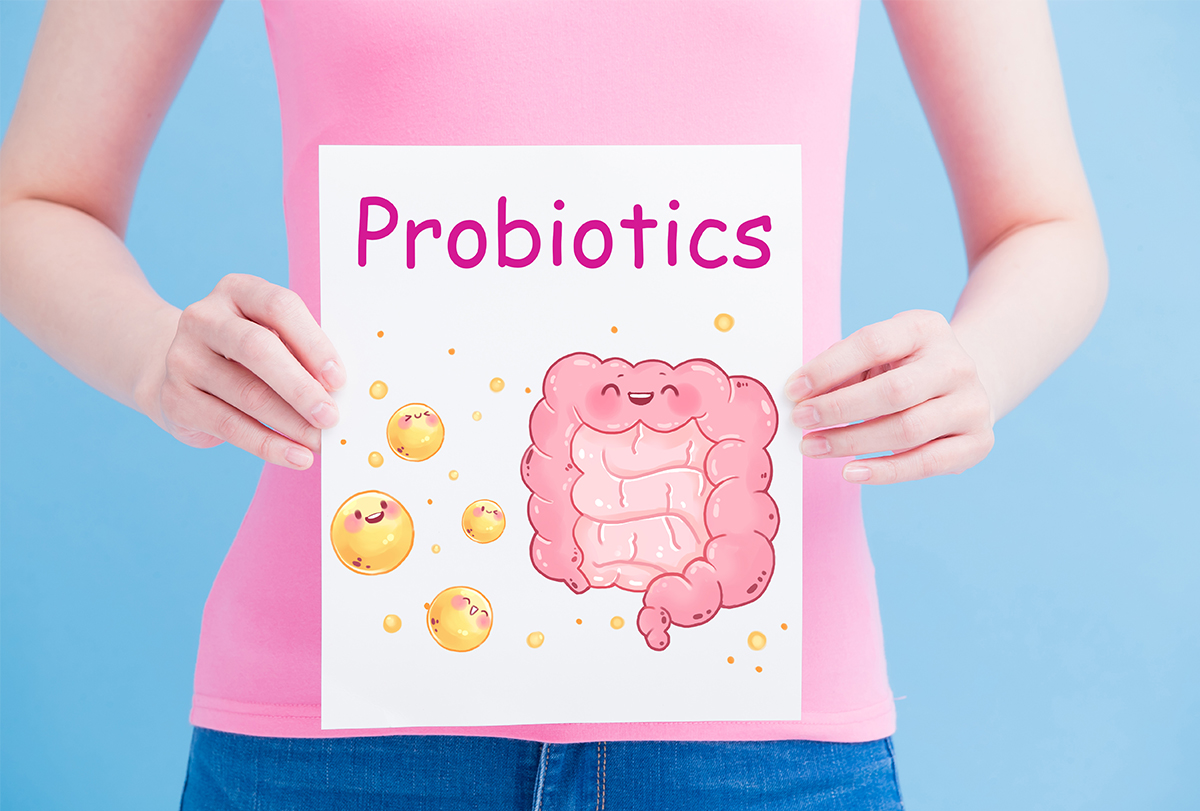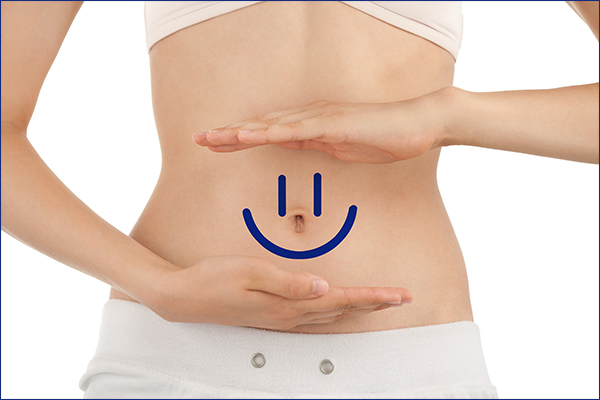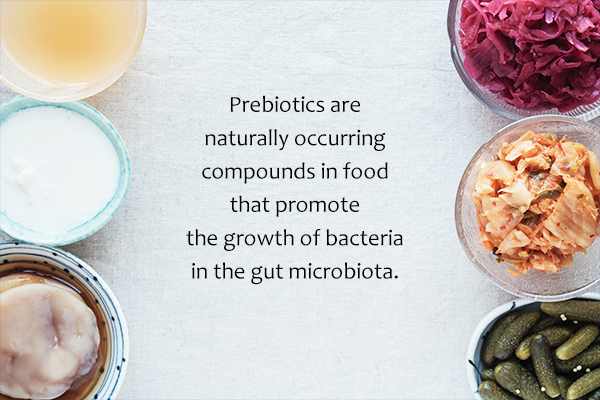In this article:
Probiotics are live microorganisms that live in the gastrointestinal tract. The gastrointestinal tract is made up of the small intestine, large intestine, and colon. This part of the body houses trillions of microbes or gut microbiota that play an important role in regulating health.

Probiotics are composed of many strains of “good” bacteria. Some common strains are Lactobacillus, Bifidobacterium, and Saccharomyces. (1)
Probiotics are considered functional food as they offer more health benefits than just the basic nutrients. There are two ways to incorporate probiotics into your diet: through food or in the form of supplements.
Foods Rich in Probiotics
Probiotics are found in many healthy foods. Some foods you may already eat without knowing you’re consuming healthy bacteria.
Foods rich in probiotics include:
- Yogurt
- Kombucha
- Kefir
- Sauerkraut
- Pickles
- Kimchi
- Miso
- Tempeh
- Some cheeses
- Beer
- Wine
Probiotics are typically found in fermented foods like sauerkraut, kombucha, and miso.
Fermentation is a process where microorganisms (i.e., yeast or bacteria) are converted from carbohydrates into alcohols or acids. This process creates an ideal environment for probiotics to thrive.
Fermentation preserves food items by giving them a longer shelf life and also gives food a distinct smell and taste that may be unpleasant for some people.
While not all foods that contain probiotics are fermented, probiotics are now added to novel food products such as ice cream, beverages, and cereals. (2)
Health Benefits of Probiotics

Probiotics are a popular topic in nutrition. While more research is being conducted to determine the efficacy and safety of probiotics, some research shows that there is a relationship between disease, health, and changes in the gut microbiota. (3)
The gut microbiota influences the health of the entire body. Probiotics play a significant role in metabolism, physiology, and immune development and function, which affect overall health. (4)
The health benefits of probiotics include:
1. Support digestive health
Probiotics have been widely studied on gastrointestinal diseases and have been shown to improve abdominal pain and symptoms of irritable bowel syndrome. (5)
2. Prevent and treat diarrhea
Research showed that probiotics are most effective for treating acute infectious diarrhea caused by bacteria but produced inconsistent results for diarrhea caused by viruses. (6)
3. May aid in weight loss
Some research revealed that probiotics play a role in promoting weight loss, although most findings are inconsistent. (7)(8)
A meta-analysis showed that the use of probiotics in combination with prebiotics created a symbiotic effect that reduced waist circumference, body mass index (BMI), visceral fat areas, and hip circumference in overweight or obese individuals. (9)
4. Reduce inflammation
Clinical trials revealed that probiotics affect the common biomarkers of inflammation, as well as the signs and symptoms of chronic inflammatory disease. (10)
5. Support immune health
Probiotics have been shown to enhance immune response locally within the gut and systematically throughout the body. (1) They also modulate the immune response for some allergens. (11)
More research is being done to further investigate the efficacy of probiotics on immune health. (12) The best way to see the health benefits of probiotics is consuming an adequate amount in your diet.
Role of Probiotics in Improving Gut Health
About one in five Americans take probiotics for their digestive health. (3) The microorganisms that occupy the gut play a crucial role in health and are influenced by external factors such as diet, lifestyle, and antibiotics.
These microorganisms strive for homeostasis or balance. When the gut microbiota becomes imbalanced, the health of the gastrointestinal tract is affected.
Probiotics are proven to be effective for diarrhea, ulcerative colitis, irritable bowel syndrome, and constipation. Taking probiotics can balance the composition of the gut microbiota and help alleviate those symptoms. (5)
What Are Prebiotics?

Prebiotics are naturally occurring compounds in food that promote the growth of bacteria in the gut microbiota. (13) They can confer health benefits when consumed. The role of prebiotics is to promote the growth and health of the good bacteria in the gut.
A majority of prebiotics are carbohydrates commonly seen as insulin, fructo-oligosaccharides, and galacto-oligosaccharides. (13) Prebiotics are found in many common foods, such as asparagus, garlic, chicory, onion, honey, banana, tomato, whole grains, and beans. (13)
Difference Between Prebiotics and Probiotics
Prebiotics and probiotics are commonly associated together as they have a synergistic relationship in the body. This means that they work together to support health.
The difference is that probiotics are good bacteria that are “live cultures” in the body, whereas prebiotics promotes the growth of these good bacteria. Prebiotics act like the food for the probiotics, and these two work together to support a healthy gut environment.
Safety of Probiotic Supplements

While food is the preferred method of consuming probiotics, probiotic supplements are shown to be a good alternative source. (14)
Supplements should only be taken if you are not consuming enough probiotics through your diet alone or if recommended by your healthcare provider.
Probiotic supplements can range from 1 to 10 billion CFU (colony-forming units) per daily dose. (14) Currently, there isn’t a recommended CFU that guarantees health benefits. It is important to consult your healthcare provider before taking a probiotic supplement.
Dietary supplements are regulated by the US Food and Drug Administration’s Center for Food Safety and Applied Nutrition. (15) However, it is important to pay attention to product labeling.
Probiotics are only effective if they are alive, not dead. When selecting a probiotic supplement, ensure that the minimum viable number of each probiotic strain is labeled at the end of the shelf-life. This number is expressed in CFU.
Do not take probiotic supplements with a CFU listed “at the time of manufacture” because it will not guarantee that the probiotics are live cultures.
Side Effects of Taking Probiotics
Overall, probiotics are safe for consumption by children, adults, and older adults. Most probiotic species are recognized by the Food and Drug Administration (FDA) as “generally recognized as safe (GRAS)” for people to consume. (16)
Some individuals may experience minor gastrointestinal side effects such as bloating, abdominal cramping, soft stools, and flatulence. (17)
However, it is recommended that individuals who are immunocompromised should be cautious when consuming probiotics and should have a conversation with their doctor before taking. (17)
Final Word
Probiotics are functional foods that offer health benefits in addition to basic nutrients. Many strains of probiotics are found in healthy foods. Eating nutritious food is the best way to get probiotics to support your gut microbiota.
What’s important is that you are consuming a diverse and wholesome diet that contains a variety of foods. You may not need to take a probiotic supplement if your diet is rich in essential health-promoting nutrients.
- Was this article helpful?
- YES, THANKS!NOT REALLY


